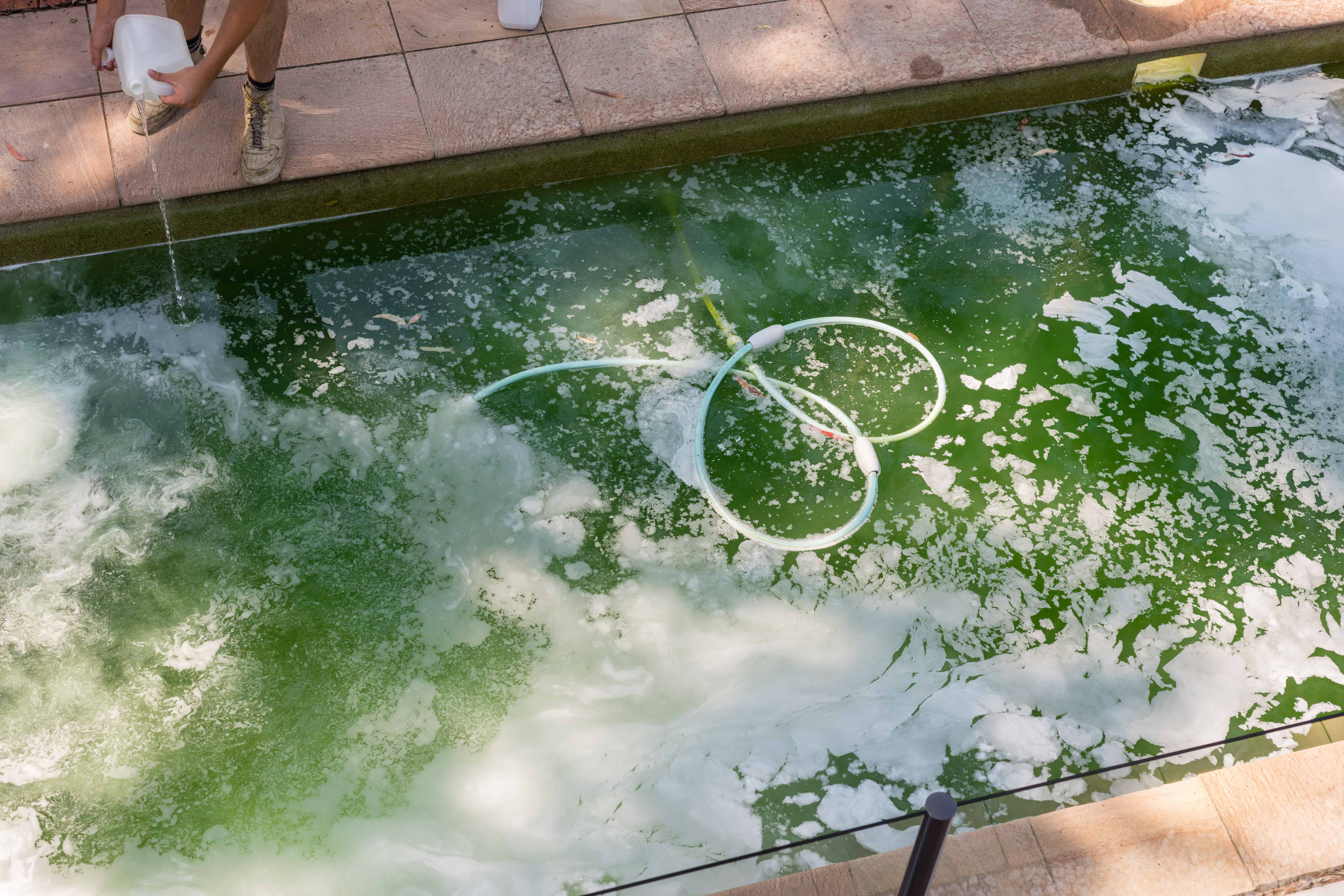Green algae in a pool is a result of improper water chemistry and ultimately a deficit or complete lack of chlorine. A bad algae breakout will not be solved with chlorine on its own despite what you might read online.
The quickest way to fix an algae bloom in your salt water pool is to balance the water, quickly get the chlorine up to 1 ppm – 3 ppm and to use a chemical algaecide to stop the algae in its tracks. Chlorine on its own won’t work.
Ensure your pH isn’t too high which is a problem that salt water pools experience. Also ensure that water filtration is adequate.
If you have a sand filter or D.E. filter and it’s due for back washing, do so. If you have a cartridge filter, wash the filter mediums to clean off algae and other debris so it can do its job.
Can you kill algae with chlorine alone?
Not in my experience. I had pea soup green pool water from algae in my water every year upon opening the pool in the spring and not once did large amounts of chlorine on its own kill the algae. I spoke with my pool company and they confirmed that on its own, the chlorine level required to kill algae by itself would have to be much higher than what you’d normally put in your pool.
Specifically, I’ve read that you’d need a chlorine level of at least 10 ppm – 20 ppm and as high as 30 ppm to effectively kill algae, depending on who you ask. A salt water pool requires a chlorine level of 1 ppm – 3 ppm so it’s much higher regardless and would require a significant chlorine purchase.
So rather than boosting your chlorine level to 30 times what it would normally be, why not just buy a bottle or two of algaecide and use that? Algaecide is specifically designed to kill algae so why not use it?
But before you buy any chemical though, take a step back and figure out why you have algae in the first place.
Can chlorine kill algae at the beginning of a bloom?
Possibly. It depends how bad the bloom is and how quickly you caught it.
If you notice algae developing in your pool, immediately check your water chemistry because undoubtedly something is wrong. Typically you are low on chlorine and might even show 0 chlorine if there is a problem with your salt cell or chlorinator.
Check specifically to ensure the sale cell is working and that salt is within range among other things.
Check your pH level because if it’s running high, it may need to be lowered.
At this point, you can shock the water to quickly raise chlorine by either using the Super Chlorinate feature of your chlorinator or by adding chemical chlorine manually.
Then brush the sides and floor of your pool to dislodge algae and vacuum the pool so that algae can get filtered out of the water and into the pool filtration system. Wash your filter mediums or back wash as required and vacuum again if necessary.
In this instance, if you catch the algae bloom early enough you can often deal with it just with chlorine along with vacuuming and brushing. But if necessary you might need to use a chemical algaecide too.
Just make sure that water chemistry is inline because if low chlorine remains a problem, you will continue to see algae until the underlying problem is correctly dealt with.
Summary
Green algae in your pool is typically caused by:
- Lack of chlorine or no chlorine at all.
- High pH which is a common problem with salt water pools specifically.
- Poor filtration which could mean you need to run the pump more and/or wash or back wash the filter depending on what system you have.
At the first sign of algae check your water chemistry to see what’s wrong and quickly correct it.
Brush your pool floor and walls and vacuum the pool to get rid of the algae as quickly as you can before it multiplies, too.
Cure each of these problems if you have them to ensure you don’t suffer from algae moving forward because it can return quickly.

